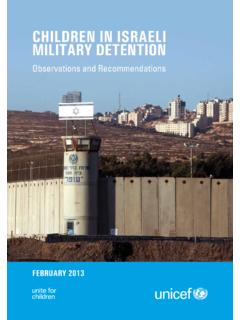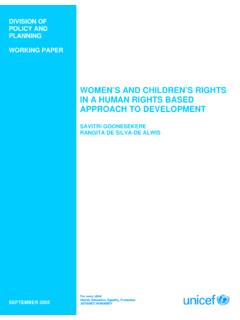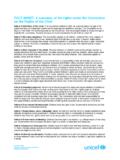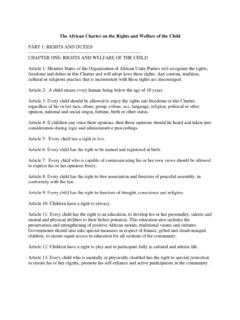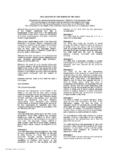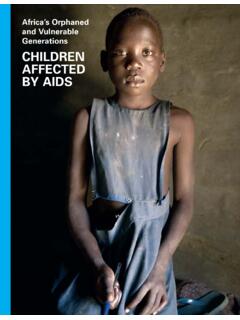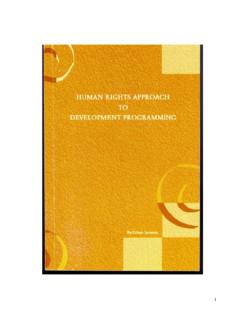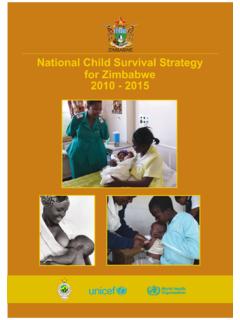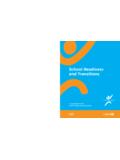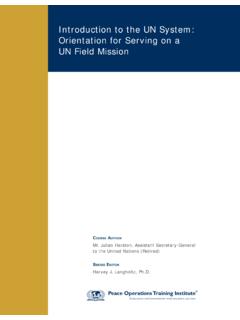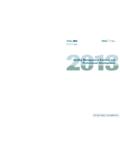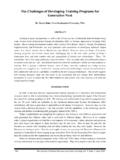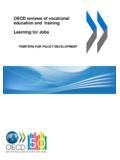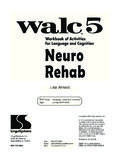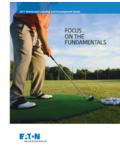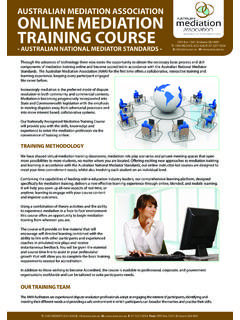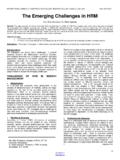Transcription of Birth Registration in Bangladesh - UNICEF
1 1 Birth Registration in | UNICEF Bangladesh Birth Registration in Bangladesh KEY STATISTICS Population under 18 years million* Proportion of children aged under five who have Birth Registration ** (2009) (2006) Age of criminal responsibility 9 Legal age of marriage 18 for girls, 21 for boys Proportion of women married before age 18, among women aged 20-49 78%** Source: *SOWC 2010, **MICS 2009 and 2006, **BDHS 2007 Background Birth Registration is a fundamental human right that is specified in the Convention on the Rights of the Child (CRC). All children have the right to a name, identity and nationality, and Birth Registration is a first and significant step in upholding these rights.
2 Birth Registration is the State s first official acknowledgement of the child s existence and is the means to secure other child rights such as access to health care and education. In addition, Birth Registration protects children from exploitation because it enables the use of legal age limits for employment, marriage, recruitment for armed forces and criminal responsibility. With the Birth certificate, the age of the child can be verified. Birth Registration is also essential for national planning and monitoring because it enables the collection of the basic demographic data required to create effective strategies.
3 Children without Birth certificates do not exist in legal terms, and their right to an official name and nationality is denied. They find themselves more vulnerable to the vicious cycle of poverty, abuse and exploitation, and they are easy prey for traffickers, slave traders and unscrupulous employers. Since 1996, UNICEF has assisted the Ministry of Local Government, Rural Development and Cooperatives to work towards universal Birth Registration through the establishment of a low-cost, easy and sustainable Birth Registration system. This has included initiatives such as introducing an appropriate legal framework, building the capacity of various stakeholders, supplying materials, improving inter-agency cooperation, and raising awareness on the importance of Birth Registration .
4 These activities have resulted in a dramatic increase in Birth Registration rates, particularly for children. The Birth Registration rate for children aged under-five increased from per cent in 2006 to per cent in 2009. 2 Birth Registration in | UNICEF Bangladesh ISSUES Awareness Historically, the biggest obstacle to Birth Registration in Bangladesh has been the lack of awareness of its importance, which led to the low demand for certificates. Parents often do not have the right information and do not understand the possible consequences of not registering their child.
5 Interagency coordination A lack of coordination between the health and education sectors and the Birth Registration system is also a hindering factor. Babies who are born in health facilities should ideally have their births registered at the time of Birth , but this does not always happen. Additionally, only 24 per cent of births are attended by skilled health personnel, so many newborns remain undetected. While Birth registrars are normally local government officials such as union council chairmen, they rely on health and education workers to report births. Therefore interagency cooperation is essential to develop a sustainable Birth Registration system.
6 Ineffective system Until 2006, Bangladesh s Birth Registration system was governed by legislation developed in 1873. Under this old legislation, Birth Registration was not required to access services, so there was little incentive for people to register their births or those of their children. The Birth Registration system was manual, ad hoc and prone to abuse. However, the Government of Bangladesh adopted the Births and Deaths Registration Act in 2004. This Act came into force in 2006 and stipulates that Birth certificates will be used as proof of age for a number of administrative procedures: issuance of an ID card, enrolment in educational institutions, marriage Registration , issuance of driving licence, etc.
7 Duplication The lack of an electronic Birth Registration system makes it difficult for Birth registrars to confirm duplication within the list. This is problematic because some people choose to revise their own ages by applying for a new Birth certificate, for a variety of reasons. For example, some parents artificially increase their daughters ages so they are above the legal marriage age of 18, while other people reduce their ages so they can apply for a government job before the cut-off age of 30. ACTION Legislative and policy reform UNICEF supported the Government to develop and enact the Births and Deaths Registration Act, 2004.
8 The 2004 Act is in line with the CRC and based on best field practice. It makes UNICEF Bangladesh /Kiron 3 Birth Registration in | UNICEF Bangladesh Birth Registration compulsory for everyone born in Bangladesh , irrespective of age, race, religion or nationality. It is accompanied by five rules that outline the practical process of registering births. Newborn babies must be registered within 45 days of Birth , and there are penalties for parents who fail to register children within two years. The Act stipulates that people must be issued with a physical Birth certificate as part of the Birth Registration process.
9 In order to increase demand for Registration , the Act makes it compulsory for people to present the Birth certificate in order to access 16 services including school enrolment, passports, voter Registration , employment in government or non-government organizations and marriage Registration . However implementation is still not universal: not all service providers demand to see the certificates as required. The Act also provided free of cost Birth Registration for the initial two-year period. The Government has also developed a Universal Birth Registration Strategy which aims to register everyone by the end of 2010.
10 Birth Registration was declared free of charge until end of December 2008 to motivate people to get their Birth certificate. This deadline has now been extended for children under 18 till end of June 2010. After this date, there will be a fee. However the Registration of babies under two years of age will remain free of charge. Inter-agency collaboration UNICEF is supporting the Government to strengthen cooperation between the health, education and Birth Registration systems to establish a sustainable process. Health workers and hospital medical officers can report new births to registrars.
